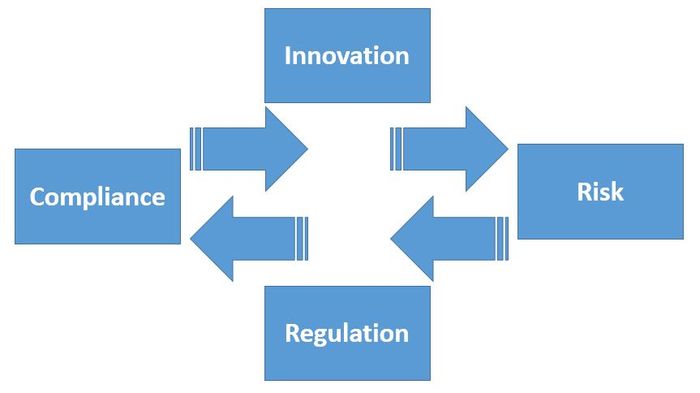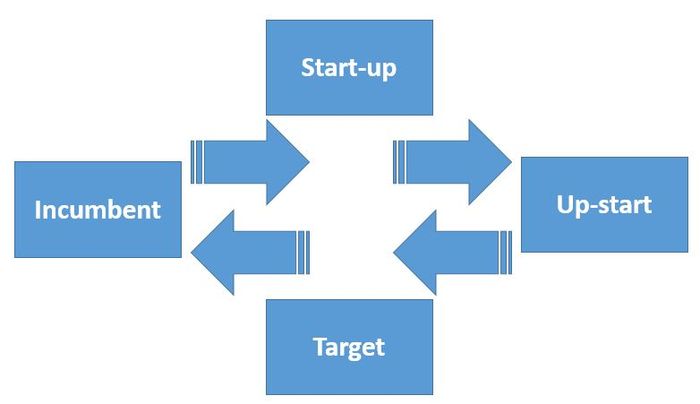
I keep coming back to this chart, as it typifies a lot of my thinking right now:

I mentioned the Uber example of this cycle, which began as a start-up but, as it grew into an upstart, it started to be attacked by the incumbents. Then the regulators woke up and started to consider the implications of the insurance of drivers, the employment status of the drivers, the safety of the passengers, etc. Then the upstart becomes the incumbent as the regulator restricts its innovation risks to be more in line with the industry it has attacked. Eventually there is a new business model that has evolved the regulations thanks to the innovation, and this new business model has a new compliance structure that must also be adhered to.
You could say that we see this in most other cycles of change. Take music. It began with Napster which morphed into iTunes and now Spotify but, with each change cycle, a new structure of guidelines is produced that must be adhered to. The same with film and film downloads and other services.
This is therefore what we see now with digital currencies, Fintech disruptors and crowdfunding lenders. They begin with an innovation model that is unlicensed and unknown but, as risks become noted, their models have their wings clipped to be more in line with the requirements of the incumbent service providers.
A great example is bitcoin. bitcoin begins life as an innovative libertarian dream of money without government. It soon encounters issues where losses mount wit Mt.Gox, Bitstamp and even the Bitcoin Foundation, and people call for protection of their bitcoins. The result is that the regulator steps in and creates a bitlicense, something that looks like a bank license but is specifically for bitcoins. Following such regulatory moves, the innovation begins to be institutionalised and is used in a new hybrid form between the incumbents and the innovators. Eventually, the innovation becomes the incumbent and the cycle starts up all over again.
This is demonstrated in many other forms. Let’s take Facebook. When Facebook started it was up against Friendster, Friends Reunited, MySpace and more. Gradually, over time, Facebook spread its wings and created risks, in terms of privacy, data usage, data sharing, advertising and more. This has led to regulatory structures that manage the Facebook ecosystem and now Facebook is the incumbent and many new innovators are trying to attack and defeat them.
In fact, I could lay another chart over this one, which is the innovator to incumbent cycle.

Uber moves from start-up to up-start and so a target for all players to attack and, eventually, becomes an incumbent once their business model is understood, regulated and compliant. Airbnb moves from start-up to up-start and so a target for all players to attack and, eventually, becomes an incumbent once their business model is understood, regulated and compliant. Facebook moves from start-up to up-start and so a target for all players to attack and, eventually, becomes an incumbent once their business model is understood, regulated and compliant. PayPal moves from start-up to up-start and so a target for all players to attack and, eventually, becomes an incumbent once their business model is understood, regulated and compliant. M-Pesa moves from start-up to up-start and so a target for all players to attack and, eventually, becomes an incumbent once their business model is understood, regulated and compliant. bitcoin moves from start-up to up-start and so a target for all players to attack and, eventually, becomes an incumbent once their business model is understood, regulated and compliant.
More on this next week …
Chris M Skinner
Chris Skinner is best known as an independent commentator on the financial markets through his blog, TheFinanser.com, as author of the bestselling book Digital Bank, and Chair of the European networking forum the Financial Services Club. He has been voted one of the most influential people in banking by The Financial Brand (as well as one of the best blogs), a FinTech Titan (Next Bank), one of the Fintech Leaders you need to follow (City AM, Deluxe and Jax Finance), as well as one of the Top 40 most influential people in financial technology by the Wall Street Journal's Financial News. To learn more click here...

